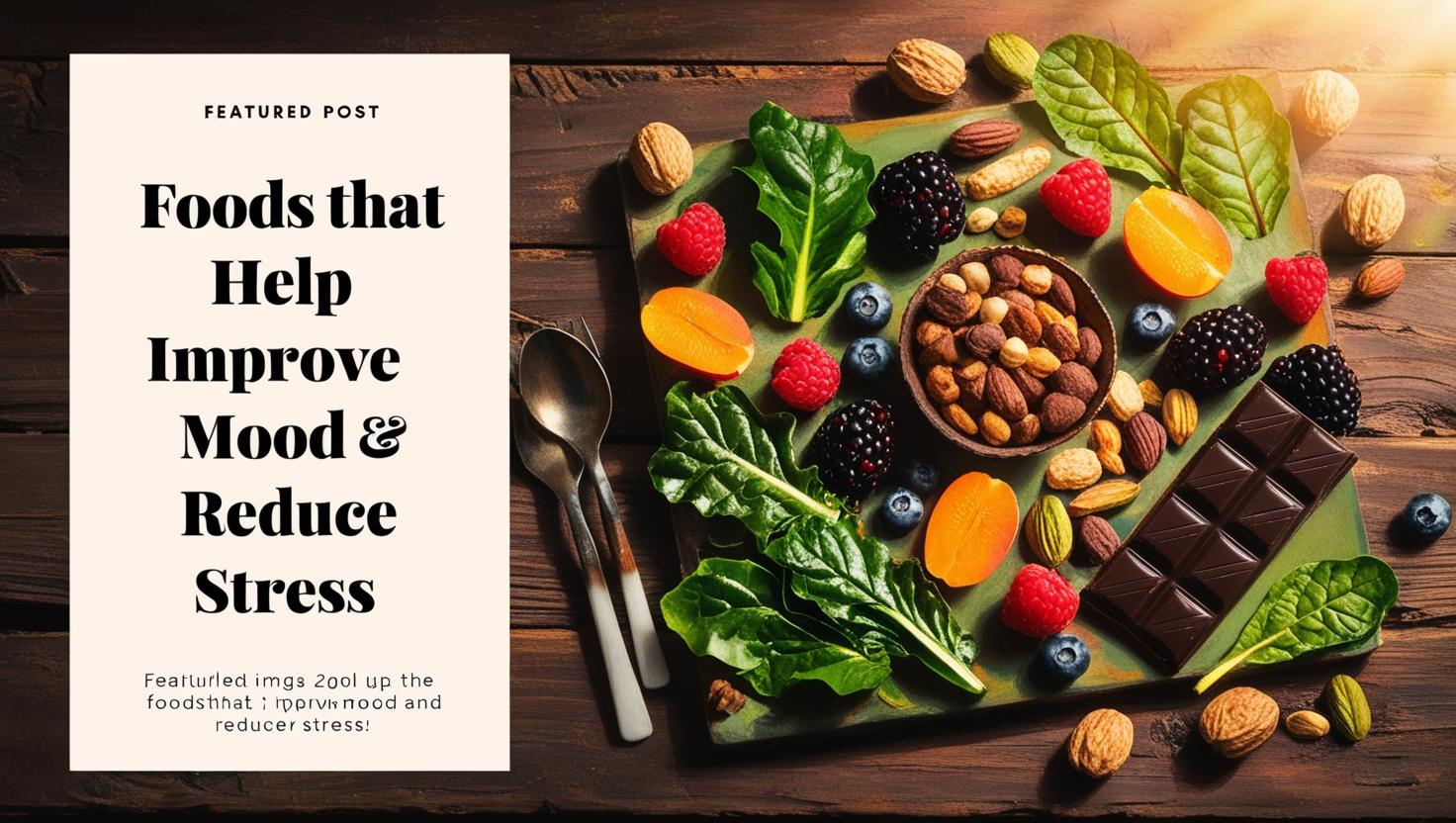Introduction
Have you ever felt irritable or overwhelmed without knowing why? Your diet might be playing a bigger role in your emotions than you realize. The connection between nutrition and mental health is undeniable. What you eat directly impacts brain chemistry, hormone production, and neurotransmitter function, all of which influence how you feel daily.
Many people turn to sugary treats or processed foods when feeling stressed, but these choices often lead to crashes in energy and mood. Instead, incorporating the right foods for mood enhancement can naturally boost happiness and help manage stress effectively. In this guide, we’ll explore the best foods to support mental well-being and how they work to keep your emotions balanced.
How Diet Affects Mood and Stress
The Science Behind Food and Emotions
Your brain relies on essential nutrients to function properly. Neurotransmitters like serotonin, dopamine, and endorphins regulate mood and stress levels. When you consume nutrient-dense foods, you provide your body with the necessary building blocks to produce these chemicals, leading to improved mental resilience and emotional stability.
Nutritional Deficiencies and Their Impact
A lack of key nutrients can contribute to mood swings, anxiety, and even depression. Common deficiencies linked to poor mental health include:
- Omega-3 fatty acids: Essential for brain function and reducing inflammation.
- B vitamins: Important for energy production and stress management.
- Magnesium: Helps relax the nervous system and regulate cortisol levels.
- Tryptophan: A precursor to serotonin, the “feel-good” hormone.
By focusing on a diet rich in these nutrients, you can create a natural defense against stress and mood fluctuations.
The Best Foods for Mood Enhancement and Stress Reduction
1. Fatty Fish
Fatty fish like salmon, mackerel, and sardines are loaded with omega-3 fatty acids, which play a crucial role in brain health. Studies suggest that regular consumption of omega-3s can reduce symptoms of anxiety and depression. If you don’t eat fish, flaxseeds, chia seeds, and walnuts are excellent plant-based alternatives.
2. Dark Chocolate
Yes, chocolate can actually be good for your mood—if you choose the right kind. Dark chocolate (at least 70% cocoa) contains flavonoids, antioxidants, and magnesium, all of which contribute to lower stress levels and improved cognitive function. Additionally, it stimulates the production of serotonin, enhancing feelings of happiness.
3. Fermented Foods
A healthy gut equals a healthy mind. Fermented foods like yogurt, kimchi, sauerkraut, and kefir contain probiotics that support gut bacteria. Research shows that a balanced gut microbiome is closely linked to improved mood and reduced anxiety.
4. Nuts and Seeds
Almonds, walnuts, sunflower seeds, and pumpkin seeds are rich in magnesium, an essential mineral that helps regulate stress hormones. A handful of these nutrient-dense snacks can work wonders in calming your nervous system.
5. Berries
Blueberries, strawberries, and raspberries are packed with antioxidants, which help combat oxidative stress in the body. These superfoods also support cognitive function and reduce inflammation, making them a great choice for mental clarity.
6. Leafy Greens
Spinach, kale, and Swiss chard are high in folate and B vitamins, which contribute to serotonin production. These leafy greens also help regulate stress hormones and keep energy levels stable throughout the day.
7. Whole Grains
Brown rice, quinoa, oats, and whole wheat bread provide complex carbohydrates that promote steady blood sugar levels. Since fluctuations in blood sugar can lead to irritability, whole grains help maintain emotional stability by ensuring a slow release of energy.
8. Green Tea
Green tea contains L-theanine, an amino acid known for its calming effects. It promotes relaxation without causing drowsiness, making it a perfect beverage for stress management.
9. Citrus Fruits
Oranges, lemons, and grapefruits are rich in vitamin C, which helps reduce cortisol levels, the primary stress hormone. A daily dose of citrus can boost immunity and improve overall mental well-being.
10. Avocados
Avocados are loaded with healthy fats, fiber, and potassium, all of which help keep stress levels in check. They also contain B vitamins that support brain function and enhance mood.
Additional Tips to Maximize Mood-Boosting Benefits
Stay Hydrated
Dehydration can lead to fatigue and irritability. Drinking enough water daily ensures your brain functions optimally, keeping your mood stable.
Reduce Processed Foods and Sugar
Highly processed foods and refined sugars cause blood sugar spikes and crashes, which negatively affect emotions. Cutting back on processed snacks can lead to better mental clarity and sustained energy.
Mindful Eating
Taking the time to enjoy and appreciate your meals allows your body to digest food properly and absorb essential nutrients. Avoid distractions while eating to fully benefit from the mood-enhancing properties of your food.
Conclusion
Your diet plays a fundamental role in how you feel. Incorporating the right foods for mood enhancement can make a significant difference in reducing stress and improving overall well-being. By focusing on nutrient-dense options like fatty fish, dark chocolate, berries, and whole grains, you can naturally balance your emotions and support mental health.
Small changes in your eating habits can have a lasting impact. Start today by adding just one of these mood-boosting foods to your diet and notice how much better you feel. A healthier mind begins with the right nutrition—are you ready to make the change?
